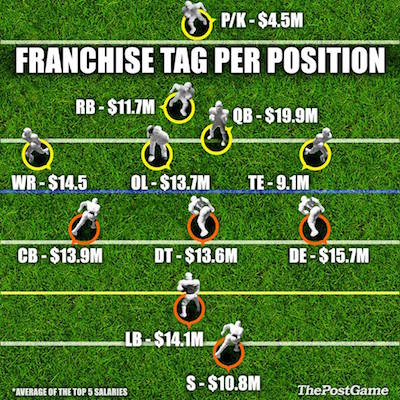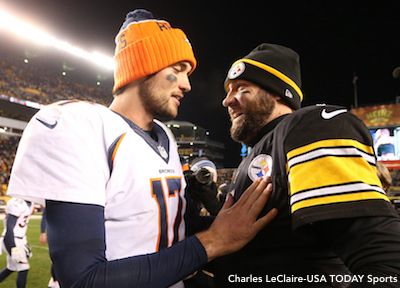The superstars of the NFL never become free agents. Teams either sign them to extended contracts that ensure players never reach the end of their contracts. If all else fails, they tag the superstar with a franchise designation. Nine teams used the franchise tag this year, up from five in 2015. A player who is franchised can be forced to play the next season, on a one-year contract, with a salary calculated by using the package average for the top five compensated players at that player's position on the field.

Who benefits from use of the tag? What are the strategies involved? Is this practice necessary for competitive balance?
Players won a dramatic victory in federal court striking down restrictions on free agency. This led to a negotiated 1993 collective bargaining agreement setting new rules for free agency.
Teams argued that the game would be totally disrupted if they lost their quarterback or another key player, and the concept of one franchise designation per team was introduced. This tag could prevent one player from heading to free agency, and could not be used again until it was removed from the designated player.
What players look for is contracts which have the most guaranteed money and largest signing bonuses possible. Football is a game fraught with injury, where every play could be the last. Even if not career-ending, injury could dramatically reduce a player's effectiveness on the field and put him in a less than enviable bargaining position. So when a critical player reaches the last year of his contract, this is the year he hopes to cash in with a long-term contract. Free agency results in explosive contracts, as it is the only way other than the draft and trade for a team to dramatically upgrade their roster. They surrender nothing in compensation to another team. When they bid against each other, normal restraints go out the window, they compete with more money. It just takes two interested teams to initiate a bidding war frenzy.
The franchise tag becomes invaluable leverage for a team facing a critical player with free agency looming. They can threaten to franchise the player. This is a power best used as a threat, because once used, the team is vulnerable to the next player whose contract is up. Franchised players have until July 15 to sign a long-term contract with their teams. Last year, four of the six players signed long-term contracts, Dez Bryant signed a five-year, $70 million package with $43.5 million guaranteed. Only Jason Pierre-Paul played out the year, with special circumstances. If an extension is worked out, do not expect anything to get done until July 15, the last day for teams to work out an extension.

Most of this year's franchised players are likely to sign, except Washington quarterback Kirk Cousins. The Redskins and Cousins want another year to see if he repeats last year's performance. Cousins will make almost $20 million and is betting he will be in stronger position a year from now to do a top of the market contract. The Redskins are hoping he flourishes, and will be willing to do a long-term contract if he repeats, but are not stuck long-term if Cousins is a one-year wonder.
The franchise tag acts as a restraint on the free market and is unnecessary. Teams always have the ability to sign their key players to long-term contracts before free agency occurs. The tag gives them unnecessary leverage with the biggest stars in the game. The tag was originally argued for with the justification that teams did not want to lose their quarterback. It is hard to remember a valued starting quarterback who was not extended.
The rule operates as protective training wheels for front offices in an unnecessary way.

-- Leigh Steinberg has represented many of the most successful athletes and coaches in football, basketball, baseball, hockey, boxing and golf, including the first overall pick in the NFL draft an unprecedented eight times, among more than 60 first-round selections. His clients have included Hall of Fame quarterbacks Steve Young, Troy Aikman and Warren Moon, and he served as the inspiration for the movie "Jerry Maguire." Follow him on Twitter @leighsteinberg.





